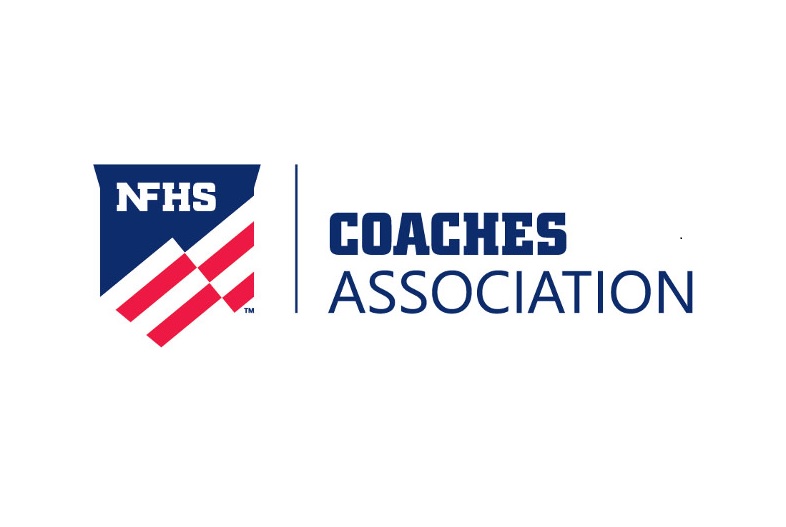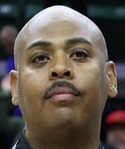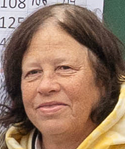
CAP Begins 2014-15 on Record Pace
By
Geoff Kimmerly
MHSAA.com senior editor
August 22, 2014
Gretchen Mohney has come to recognize coaches who think they already know it all.
Then she begins a Coaches Advancement Program lesson by describing an orange banging around inside a fishbowl – a metaphor to explain the brain inside an athlete’s skull when he or she suffers a concussion.
Her most powerful lessons have moved pupils to tears. And it’s always gratifying to witness the “Aha” moments that make the CAP educational experience so powerful.
“My favorite is when they admit that they’ve done something wrong, and they want to know how to do something better,” said Mohney, a highly-respected trainer and strength and conditioning coach who also serves as an instructor for the athletic training program at Western Michigan University. “It’s a pretty awesome moment when they realize there’s more to learn.”
More current and aspiring coaches than ever before are taking advantage of that opportunity as the 2014-15 school year kicks off.
Since this training year began July 25 at Battle Creek Lakeview, 273 current or aspiring coaches have completed CAP sessions – nearly twice as many coaches as this point a year ago and with the last session of August planned for Saturday at New Buffalo. That makes this the busiest start in CAP history, according to MHSAA assistant director Kathy Vruggink Westdorp, who joined the MHSAA staff in 2004, developed CAP for the 2004-05 school year and continues to oversee the program.
This first month’s total attendance also represents 33 percent of the 818 total CAP units completed at high schools and the MHSAA office during all of 2013-14.
“I think the big thing continues to be word of mouth that this is a quality program,” said Hamilton athletic director Jerry Haggerty, a CAP instructor for nine years. “It’s good for all coaches of all experience levels.”
Setting a standard
Since the program’s inception, nearly 6,300 coaches have completed at least the first-level unit. More than 1,000 have advanced through CAP 4.
The CAP program is broken into six levels, each addressing a set of topics:
- CAP 1: Coaches Make the Difference, The Coach as Teacher, Sports Medicine and First Aid.
- CAP 2: Effective Communication, Legal Responsibilities, Psychology of Coaching.
- CAP 3: Additional Coaching Responsibilities, Effectively Working with Parents, The Coach as Performer.
- CAP 4: Understanding Athletic Development, Strength and Conditioning, Preparing for Success.
- CAP 5: Healthy Living, Teaching Emotional Toughness, Resolving Conflicts in Athletics.
- CAP 6: Current Issues and Topics in Educational Athletics.
“Individuals who go through this have a better understanding of their philosophy, their school’s philosophy, their role and responsibility as well as the meaning behind MHSAA rules,” said Westdorp, a former principal, athletic director, teacher and coach in the Grand Rapids area who was named 2013 Coach Educator of the Year by the National Federation of State High School Associations (NFHS) for her work with the program.
She trains and evaluates all presenters and instructors, including those who last school year administered 1,238 CAP sessions at seven universities and colleges across both peninsulas.
The non-college CAP sessions are taught by 20 instructors who pride themselves on being available anywhere there’s interest. CAP has been presented at 10 Lower Peninsula schools over the last month, with Upper Peninsula sessions planned for this fall. August 9 was particularly busy – units were taught at Jonesville, Pontiac Notre Dame Prep and Riverview Gabriel Richard – but Westdorp sees the possibility of presenting at up to five sites on the same day.
Flexibility also is an option; a group of mostly non-school coaches took CAP 2 last week in Baldwin, and were able to complete the course over two days instead of one so they could do so without interrupting their fulltime jobs. For coaches working in schools, CAP units can qualify as continuing education credits with the State Department of Education.
Colleges and universities in Michigan are licensed to present up to five levels through their undergraduate or graduate studies, and the list of those who completed courses the last few years is filled with recognizable names of former high achievers on MHSAA courts and fields. Southwestern Michigan College in Dowagiac will offer courses for the first time this fall.
Certification in the program occurs after completion of CAP 1 and 2, and then after each subsequent unit, with those completing CAP 6 earning Masters Elite Certification.
The topics of CAP sessions “bleed” into each other, Mohney said, and come with plenty of first-person examples to make them relevant to coaches who then realize they aren’t alone facing issues most encounter.
“I talk to them because I’ve been there. … (I say,) ‘Now, let’s talk real.’ I place them in a real situation,” Mohney said. “’The biggest thing is you guys don’t have to know everything. You just need to coach, be aware of this, this and that. And these are some ideas to go about your plan so you can decrease your stress.’
“Any time a coach hears that, it’s a beautiful thing. Because I’m not sure what coach in high school is in coaching for the money.”
Raising the bar
Certainly, some of this month’s heightened CAP participation can be attributed to an MHSAA Representative Council action in March. Beginning Aug. 1, 2016, varsity head coaches hired for the first time at an MHSAA member school must have completed CAP 1 or CAP 2. Westdorp said some who wish to become head coaches in that near future are getting a jump by completing CAP courses now.
But that’s only a slice of the success story.
Haggerty has directed Hamilton’s athletic department for 15 years and said all of his coaches have taken either CAP 1 or 2. Many coaches take the courses on their own; others are required to do so by their athletic directors.
The Capital Area Activities Conference will offer CAP 1 three times this school year, with 100-150 coaches from their 20 member schools expected for each session. Others leagues and conferences are designing similar arrangements.
Michael Roy coached boys basketball at Lawton and girls hoops at Vicksburg and was certified under the predecessor to CAP – the MHSAA’s former Program for Athletic Coaches’ Education (PACE). He’s beginning his 13th year as Vicksburg’s athletic director, and after hosting several CAP classes over the years decided to begin the program himself this month.
“The need for knowledgeable and experienced coaches is greater than ever before. I thought if I was going to make it mandatory for my coaches to become CAP certified, that I needed to get CAP certified and lead by example,” Roy said. “The heart of any athletic team or program is its coaching staff. CAP is the surest way for coaches to access everything they need to know how to be a good coach. They learn the art of effective coaching through one of the best-designed coaches education programs in the country. CAP is second to none.”
Haggerty has spoken with athletic directors who have completed the program and then recognize when their coaches employ strategies learned at CAP sessions. An increasing pool of coaching candidates are heading into interviews with CAP certification in hand, and Westdorp has seen coaches bringing their CAP binders to practices to have those lessons available for quick reference. She’s also watched many CAP graduates using their skills at the highest level – the MHSAA Finals.
A comment by Duke men’s basketball coach Mike Krzyzewski sits at the front of those CAP binders: “A common mistake among those who work in sport is spending a disproportional amount of time on x’s and o’s as compared to time spent learning about people.”
Haggerty starts each session telling his pupils, “I do this for two reasons; one because I think it’s important to look at the non-x and o coaching realms; and two, because this is great fun for me.’”
And those coaches who come into CAP thinking they know enough? Mohney said most finish the first unit looking forward to beginning the next.
“CAP has a lot to do with understanding what you’re about, understanding your role and responsibility in athletics and your leadership role,” Westdorp said. “When I start programs, I talk about my work roles in life, and then (I tell coaches), ‘I want to tell you where I felt I was more influential, and that was as a coach.
“’And don’t ever forget it..’”
Click for more on the Coaches Advancement Program.
PHOTOS: These coaches, counter-clockwise from top left, all have completed at least one CAP unit: Bay City Western softball coach Rick Garlinghouse, St. Ignace girls basketball coach Dorene Ingalls, Ypsilanti Community boys basketball coach Steve Brooks, Beal City baseball coach Brad Antcliff and Mattawan softball coach Alicia Smith.

Michigan Leaders in 3 Sports Earn National Honors from NFHS Coaches Association
By
Geoff Kimmerly
MHSAA.com senior editor
January 16, 2024
Detroit Cass Tech boys basketball coach Steve Hall, Farmington Hills Mercy girls golf coach Vicky Kowalski and East Grand Rapids girls swimming & diving coach Butch Briggs and have been named a 2022-23 National Coach of the Year in their respective sports by the National Federation of State High School Associations (NFHS) Coaches Association.
They were selected by a committee including representatives from all eight NFHS sections – Michigan is part of Section 4 with Illinois, Indiana, Iowa and Wisconsin.
The following brief bios include an excerpts from each honoree’s coaching philosophy, which nominees were asked to submit after being identified as candidates for the awards.
 Steve Hall guided Detroit Cass Tech to its first MHSAA Finals championship last season as the Technicians capped a 28-1 run. He’s 160-30 in his eighth season directing Cass Tech, with his team 9-0 this winter, and he has a career high school record of 370-103 having also coached at Detroit Rogers (1996-97 through 2004-05) and Detroit Northwestern (2005-06 through 2007-08). He led Rogers to three straight Class D championships from 2003-05, led Northwestern to its first Detroit Public School League championship in 30 years and Cass Tech to its first in the PSL in 19 seasons. He also coached collegiately as an assistant at Duquesne University (2008-09 through 2011-12) and Youngstown State University (2011-12 through 2014-15) before taking over at Cass Tech for the 2015-16 season. He has received multiple state Coach of the Year awards during his tenures at Rogers and Cass Tech, and also serves the latter as athletic director and boys cross country coach.
Steve Hall guided Detroit Cass Tech to its first MHSAA Finals championship last season as the Technicians capped a 28-1 run. He’s 160-30 in his eighth season directing Cass Tech, with his team 9-0 this winter, and he has a career high school record of 370-103 having also coached at Detroit Rogers (1996-97 through 2004-05) and Detroit Northwestern (2005-06 through 2007-08). He led Rogers to three straight Class D championships from 2003-05, led Northwestern to its first Detroit Public School League championship in 30 years and Cass Tech to its first in the PSL in 19 seasons. He also coached collegiately as an assistant at Duquesne University (2008-09 through 2011-12) and Youngstown State University (2011-12 through 2014-15) before taking over at Cass Tech for the 2015-16 season. He has received multiple state Coach of the Year awards during his tenures at Rogers and Cass Tech, and also serves the latter as athletic director and boys cross country coach.
“My coaching philosophy is ‘Learning Life Skills Through Basketball.’ I have encountered many youngsters that value basketball more than anything. Therefore, I use basketball as a carrot to dangle to help them acquire life skills and other necessities that can benefit them in their lives. Ultimately, when the ball stops bouncing they may be quality fathers, husbands, principals, CEOs, etc., and positive contributors to society. My motto is, “Be better today than yesterday and better tomorrow than today.” My athletic philosophy is scholarships and championships in that order! We love to win. But winning is not only on the scoreboard but also in life. Accountability, Reliability, Dependability and Responsibility. “Do what you are supposed to do, be where you are supposed to be, every play and every day.” God has blessed me with high morals, values and unmatched energy to leave my student athletes better than I found them.”
 Vicky Kowalski completed her 46th season this fall coaching Farmington Hills Mercy’s girls golf team, and led the program to its second-straight Lower Peninsula Division 2 championship and fourth MHSAA Finals title overall. Her teams also have won seven Regional and 21 league championships and were 220-50 in matches entering the season. She has received several coaching awards over the years including statewide awards from the Michigan Interscholastic Golf Coaches Association (MIGCA) and Michigan High School Coaches Association (MHSCA). Kowalski also is in her 22nd season as Mercy’s girls bowling coach and has coached multiple subvarsity seasons of basketball and volleyball as well. She’s been inducted into Halls of Fame by both MIGCA and the Michigan High School Interscholastic Bowling Coaches Association (MHSIBCA).
Vicky Kowalski completed her 46th season this fall coaching Farmington Hills Mercy’s girls golf team, and led the program to its second-straight Lower Peninsula Division 2 championship and fourth MHSAA Finals title overall. Her teams also have won seven Regional and 21 league championships and were 220-50 in matches entering the season. She has received several coaching awards over the years including statewide awards from the Michigan Interscholastic Golf Coaches Association (MIGCA) and Michigan High School Coaches Association (MHSCA). Kowalski also is in her 22nd season as Mercy’s girls bowling coach and has coached multiple subvarsity seasons of basketball and volleyball as well. She’s been inducted into Halls of Fame by both MIGCA and the Michigan High School Interscholastic Bowling Coaches Association (MHSIBCA).
“I have always believed in participation. On all the teams I have coached, everyone plays – no one sits the bench. All my athletes have their opportunities to grow in the sport. I have always preached dedication and sportsmanship. The athletes practice well to perform well. They encourage teammates as well as competitors. I enjoy interaction with other coaches. We share coaching techniques and ideas for improving team performance.”
Milton “Butch” Briggs has led the East Grand Rapids girls swimming & diving team to a record 26 MHSAA Finals team championships, the first in 1978 and including six straight from 1981-86 and the program’s current three-year title streak. His girls program also has celebrated 105 individual or relay Finals champions and clinched 33 league team titles. Briggs has received several coaching awards, including nationally for his sport (girls and boys combined) from the National High School Athletic Coaches Association (NHSACA) in 2000 and the NFHS Coaches Association for boys swimming & diving in 2011. He entered this past fall season with a dual meet record of 522-65-1 over his career, which has spanned 49 years total, and his boys teams have won 12 MHSAA Finals. Briggs also has served as an assistant track coach at multiple schools and as MISCA president, and is in the MHSCA Hall of Fame.
“My coaching philosophy has been, and continues to be, a work in progress. I have formed relationships with hundreds of amazing young people. They have taught me life lessons in real time and real situations. As a neophyte coach, the experience revolved around winning. We worked together as a team, supported each other in and out of the pool, and won often. Thankfully, I became aware of the value within each athlete. Today, I attempt to interact with each athlete at every team activity and follow their progress in non-swimming endeavors. In short, when I removed my ego from the team's expectations and outcomes, the entire atmosphere was much more enjoyable and productive. And we are still capable of being successful. The Lord has put me in the right place at the right time.”
Six more Michigan coaches earned honors in Section 4. Stefanie Kerska was honored in boys swimming & diving after leading Ann Arbor Pioneer to its third-straight Lower Peninsula Division 1 Finals title under her leadership, and Asa Kelly was recognized in boys track & field after leading Benzie Central to the LPD3 Finals championship. Mt. Morris volleyball coach James Pender was honored after leading his team to the Division 2 Quarterfinals in 2022, when he also eclipsed 1,000 career coaching wins in the sport, and Traverse City St. Francis’ Julie Duffing was awarded in cross country after leading her program to the 2022 LPD3 Finals championship, the program’s second under her leadership. Haslett/Williamston girls lacrosse coach Chad Pastor was honored after leading his team to the Division 2 Semifinals last spring, and Hartland competitive cheer coach Candace Fahr was recognized after leading her team to the MHSAA Finals for the fourth time in her six seasons guiding the program.
The NFHS has been recognizing coaches through an awards program since 1982.

